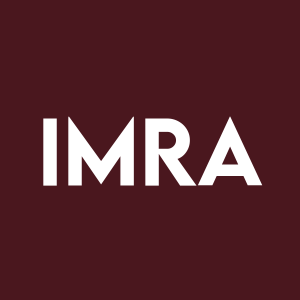Imara Receives Orphan Drug Designation from the European Commission for IMR-687 for the Treatment of Sickle Cell Disease
Imara Inc. (Nasdaq: IMRA) has received Orphan Drug designation from the European Commission for IMR-687, aimed at treating sickle cell disease (SCD). This designation highlights the critical need for effective SCD treatments, as the condition significantly impacts patients' lives. The company is advancing IMR-687 through a Phase 2b clinical trial. Orphan Drug designation provides several advantages, including market exclusivity, reduced fees, and specialized regulatory support, facilitating the development and approval process for this therapy.
- Received Orphan Drug designation from the European Commission for IMR-687.
- IMR-687 is in Phase 2b clinical trial for sickle cell disease.
- Designation highlights unmet medical need, potentially enhancing market opportunities.
- None.
BOSTON, Aug. 25, 2020 (GLOBE NEWSWIRE) -- Imara Inc. (Nasdaq: IMRA), a clinical-stage biopharmaceutical company dedicated to developing and commercializing novel therapeutics to treat patients suffering from rare inherited genetic disorders of hemoglobin, today announced that the European Commission granted Orphan Drug designation to IMR-687 for the treatment of patients with sickle cell disease (SCD). IMR-687 has previously been granted Orphan Drug, Fast Track and Rare Pediatric Disease designations from the U.S. Food and Drug Administration (FDA) for the treatment of patients with SCD.
“We are pleased to have received Orphan Drug designation from the European Commission, reinforcing the unmet need for more effective treatment options for patients with sickle cell disease, a rare blood disorder characterized by debilitating pain, progressive multi-organ damage and early death,” said Rahul Ballal, Ph.D., President and Chief Executive Officer of Imara. “We are making positive strides to advance IMR-687 for the treatment of sickle cell disease, including the recent initiation and patient dosing of our Phase 2b clinical trial for this patient population.”
To qualify for Orphan Drug designation in the European Union (EU), an investigational medicine must be intended to treat a seriously debilitating or life-threatening condition that affects fewer than five in 10,000 people in the EU, and there must be sufficient non-clinical or clinical data to suggest the investigational medicine may produce clinically relevant outcomes. Orphan Drug designation in the EU provides companies with certain benefits and incentives, including clinical protocol assistance, differentiated evaluation procedures for Health Technology Assessments in certain countries, access to a centralized marketing authorization procedure valid in all EU member states, reduced regulatory fees and ten years of market exclusivity.
About IMR-687
IMR-687 is a highly selective and potent small molecule inhibitor of PDE9. PDE9 uniquely degrades cyclic guanosine monophosphate (cGMP), an active signaling molecule that plays a role in vascular biology. Lower levels of cGMP are often found in people with sickle cell disease and beta-thalassemia and are associated with impaired blood flow, increased inflammation, greater cell adhesion and reduced nitric oxide mediated vasodilation.
Blocking PDE9 acts to increase cGMP levels, which are associated with reactivation of fetal hemoglobin, or HbF, a natural hemoglobin produced during fetal development. Increased levels of HbF in red blood cells have been demonstrated to improve symptomology and lower disease burden in patients with sickle cell disease and patients with beta-thalassemia.
About Imara
Imara Inc. is a clinical-stage biotechnology company dedicated to developing and commercializing novel therapeutics to treat patients suffering from rare inherited genetic disorders of hemoglobin. Imara is currently advancing IMR-687, a highly selective, potent small molecule inhibitor of PDE9 that is an oral, once-a-day, potentially disease-modifying treatment for sickle cell disease and beta-thalassemia. IMR-687 is being designed to have a multimodal mechanism of action that acts on red blood cells, white blood cells, adhesion mediators and other cell types. For more information, please visit www.imaratx.com.
Cautionary Note Regarding Forward-Looking Statements
Statements in this press release about future expectations, plans and prospects, as well as any other statements regarding matters that are not historical facts, may constitute “forward-looking statements” within the meaning of The Private Securities Litigation Reform Act of 1995. These statements include, but are not limited to, statements made by Dr. Ballal in this press release and statements relating to the potential advantages of Orphan Drug designation by the European Commission. The words “anticipate,” “believe,” “continue,” “could,” “estimate,” “expect,” “intend,” “may,” “plan,” “potential,” “predict,” “project,” “should,” “target,” “will,” “would” and similar expressions are intended to identify forward-looking statements, although not all forward-looking statements contain these identifying words. Actual results may differ materially from those indicated by such forward-looking statements as a result of various important factors, including: the impact of extraordinary external events, such as the risks and uncertainties resulting from the impact of the COVID-19 pandemic on the Company’s business, operations, strategy, goals and anticipated milestones and other factors discussed in the “Risk Factors” section of the Company’s most recent Quarterly Report on Form 10-Q, which is on file with the Securities and Exchange Commission and in other filings that the Company makes with the Securities and Exchange Commission in the future. Any forward-looking statements contained in this press release speak only as of the date hereof, and the Company expressly disclaims any obligation to update any forward-looking statement, whether as a result of new information, future events or otherwise.
Media Contact:
Gina Nugent
Ten Bridge Communications
617-460-3579
gina@tenbridgecommunications.com
Investor Contact:
Michael Gray
617-835-4061
mgray@imaratx.com
FAQ
What is the significance of the Orphan Drug designation for IMRA's IMR-687?
What is IMR-687 being developed for?
When did Imara announce the Orphan Drug designation for IMR-687?
What advantages does Orphan Drug designation provide to IMRA?







